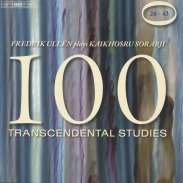100 Transcendental Studies, Nos. 26–43
Fredrik Ullén (piano)
BIS Records: BIS-CD-1533 (2009)
Web page for BIS RecordsWeb page for BIS Records BIS-CD-1533
 Duration: 76:18
Comments: The second volume of Ullén’s complete survey of the 100 Transcendental Studies. This CD contains studies 26–43.
Duration: 76:18
Comments: The second volume of Ullén’s complete survey of the 100 Transcendental Studies. This CD contains studies 26–43.See Fredrik Ullén’s list of comments on most of Sorabji’s 100 Études transcendantes and a summary table of all known first performances of individual études.
Track listing
- Track 1: 100 Transcendental Studies 26. Dolcissimo (9:56)
- Track 2: 100 Transcendental Studies 27. Staccato e leggiero a capriccio (2:57)
- Track 3: 100 Transcendental Studies 28. Leggiero e volante (2:15)
- Track 4: 100 Transcendental Studies 29. A capriccio. Leggiero (2:09)
- Track 5: 100 Transcendental Studies 30. Con fantasia (4:36)
- Track 6: 100 Transcendental Studies 31. Vivace assai (2:14)
- Track 7: 100 Transcendental Studies 32. Legato possibile, quasi dolce (3:12)
- Track 8: 100 Transcendental Studies 33. Vivace e brioso (4:42)
- Track 9: 100 Transcendental Studies 34. Soave e dolce. Insinuante (4:11)
- Track 10: 100 Transcendental Studies 35. — (2:17)
- Track 11: 100 Transcendental Studies 36. Mano sinistra sempre sola (7:16)
- Track 12: 100 Transcendental Studies 37. Riflessioni. Moderato (3:54)
- Track 13: 100 Transcendental Studies 38. Con fantasia (4:53)
- Track 14: 100 Transcendental Studies 39. — (3:34)
- Track 15: 100 Transcendental Studies 40. Moderato (3:09)
- Track 16: 100 Transcendental Studies 41. — (3:40)
- Track 17: 100 Transcendental Studies 42. Impetuoso e con fuoco ed energia (4:15)
- Track 18: 100 Transcendental Studies 43. — (4:39)
Reviews
- “Volume 2 of this much-anticipated continuation of Sorabji’s mammoth set of studies takes us almost half way in terms of number, if not in playing time (perhaps a third or thereabouts). The reason for this is encapsulated in the first entry on this new disc; with No.26 the composer appears for the first time to take a decisive step back from writing pieces with some ostensibly pedagogical intent — “studies” per se — and interjects a larger, more musically intricate piece; in this case a ravishing nocturne (a favorite genre of the composer’s) with somewhat in common with Djâmî for instance, the piece’s repeated chordal figuration a trademark of Sorabji’s highly ornamented entanglements of decoration, bathing languidly progressing melodies in an atmosphere of stifling tropical heat. The composer seems to have thought highly of this study too, as it was among the handful that he chose to record privately for his friend Frank Holliday. But the concept of ‘études’ is by no means abandoned of course; Sorabji follows this sensuous interlude with formidable studies in sevenths, octaves, thirds and sixths, grace-notes, contrary motion, various chords and scales, and a fiendish left-hand study which ends with a fairly thoroughly worked fugue complete with the characteristic Sorabji coda-stretta and final explosive flourish. As the nature of the pieces becomes more varied it is truly fascinating to witness Sorabji encapsulating familiar elements of his unique compositional vocabulary in miniature (or not-so-miniature; among many delights we still have the grandly splendid waltz (No.63), the passacaglia (No.75, with, of course, 100 variations) and the extravagantly virtuosic prelude (No.99) and five-subject fugue (No.100) to look forward to).” (Records International)
